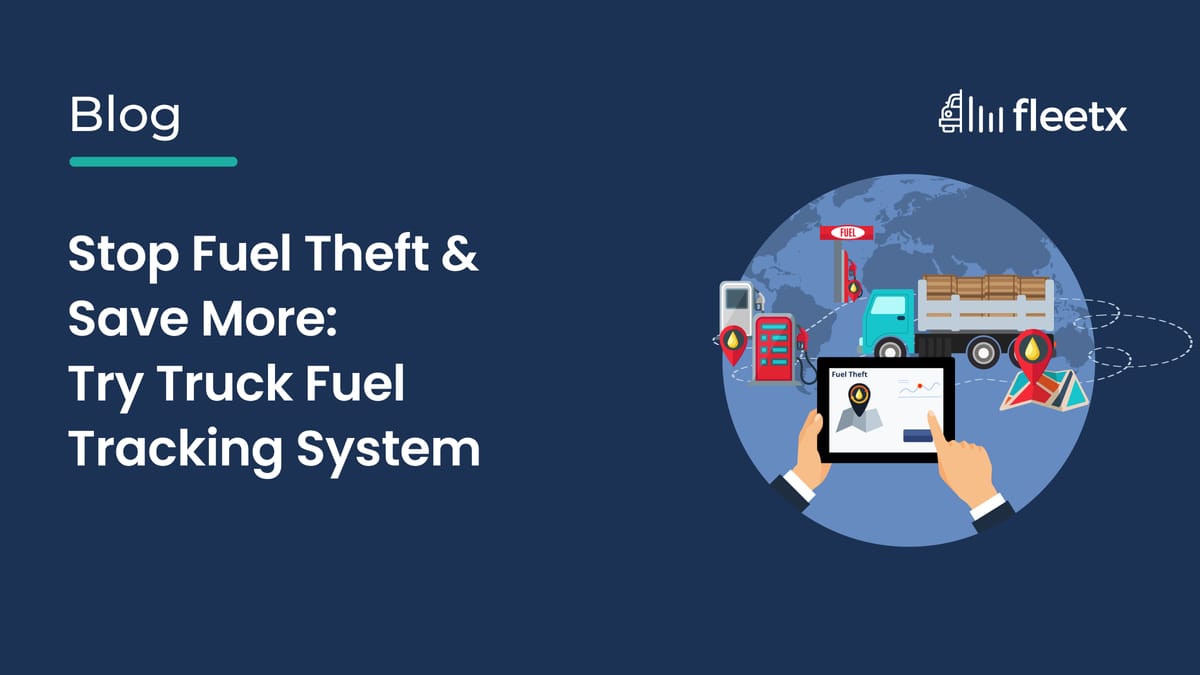In fleet management, improving cost efficiency is one of the most significant aspects of driving profitability. Fuel consumption is one of the major variable expenses, making it critical for businesses to implement an automated fleet management solution that includes a vehicle tracking and fuel monitoring system.
The bulk of India’s freight is transported by road - almost 70%. Heavy and medium-duty vehicles undertake most of the transportation and fuel accounts for a significant portion of the operating expenses. With ever-soaring fuel prices, a vehicle fuel management system becomes essential for controlling fuel costs and preventing fuel pilferage.
A GPS-based vehicle tracking system combined with a fuel sensor provides actionable insights into the vehicle’s performance and fuel efficiency. These sensors monitor fuel levels, idling, and attempts at fuel theft.
An Overview - Vehicle Fleet Fuel Management
Overspending on fuel budgets is a common issue for fleet owners, driven by several factors including:
- Fuel consumption
- Fuel wastage through idling, hard braking, etc.
- Fuel theft and pilferage
- Low fuel levels
While some of these are unavoidable circumstances – such as the need to apply sudden brakes - an effective vehicle fuel monitoring system enables fleet managers to reduce costs significantly.
An advanced fleet management platform goes beyond fuel sensors and GPS tracking. It offers real-time actionable insights that help transform your fleet operations. An integrated system that provides high-quality fuel data and abnormality alerts can vastly improve your fleet’s fuel strategy.
Why Make the Shift from Manual to Automated Fuel Monitoring?
Before the initiation of technological advancements in vehicle fuel tracking system, fleet operators recorded estimated fuel data manually, making it time-consuming and prone to error. Most of this information was calculated when the fuel was filled, ejected, or used from the vehicle.
Gradually, the vehicle fuel consumption Excel sheet gained significance, replacing paper and pen, and simplifying the analysis. However, the major challenge persisted - the manually collected and estimated data being updated on the sheets.
Finally, automated fleet management systems that incorporate vehicle fuel management by combining hardware and software improved the efficiency of fuel monitoring. Now, fleet operators install fuel sensors in vehicle tanks and the software offers automated insights based on the real-time data captured from hardware.
The data captured by fuel sensors include:
- Live fuel levels
- Real-time fuel consumption
- Fuel consumption trends mapped to the vehicle speed and odometer readings
- Vehicle mileage
- Fuel wastage indicators
The vehicle’s overall fuel data becomes a primary tool that assists in driver behavior analysis and route planning.
Fuel Management System Attributes
Fuel Management System Attributes
The key offerings of this software include:
Real-Time and Historical Data Availability
Managers can access live fuel consumption records and also comprehensive fuel performance, offering a complete view of the vehicle’s fuel efficiency.
System Alerts
System-generated instant alerts notify fleet operators when there is a marked change in the fuel levels - during refueling or fuel drainage, enhancing control over fuel usage.
Detailed Records
Data collected from hardware and software is compiled as detailed reports, easily accessible through user-friendly dashboards, and allows thorough analysis.
Other Relevant Insights
The connected ways that fuel monitoring systems assist fleet owners include budgeting support, route optimization, and enhanced driver performance analysis.
Why is Fuel Monitoring System a Valuable Business Asset?
Fuel monitoring systems combine fuel sensors and GPS tracking systems to aid vehicle owners. The business benefits include:
Minimized Fuel Wastage
Fuel reports and idling notifications help owners track fuel usage trends across the fleet. The major problem areas can be detected faster and business strategies can be optimized accordingly. Detecting aggressive driving behavior reduces fuel expenses significantly and also improves vehicle efficiency.
Reduced Fuel Theft or Pilferage
An automated solution identifying the precise points of fuel loading or unloading offers a detailed check at all points of fuel transactions, improving the control of owners on their fleets.
Better Driver Oversight
Analyzing sudden vehicle activity including rapid acceleration and hard braking indicates erratic driving behaviors, mapping the drivers’ performance. Combining GPS data and fuel sensor data also allows businesses to monitor each vehicle’s condition and efficiency.
Positive Environmental Impact
Efficient fuel usage reduces vehicle emissions, favoring the fleet’s environmental impact. The business reputation toward sustainability gets a major boost.
Summing Up
A fuel monitoring system is a crucial component of modern fleet functioning. By reducing fuel theft, minimizing fuel wastage, and improving overall fuel efficiency, these systems lower fleet operation costs. With the integration of fuel sensors and GPS tracking, fuel monitoring systems have become a convenient functional tool for fleet owners.






